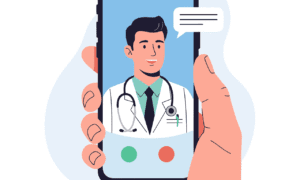Using communications technology to provide better digital health interventions to prevent disease and improve quality of life isn’t an entirely new concept. An 1879 Lancet article, for example, discussed using the telephone to reduce unnecessary office visits. In addition, the cover of Science and Invention magazine in 1925 depicted a doctor using radio to diagnose a patient. Those are among the earliest pieces of evidence that telehealth services have indeed been around for a while.
Without a doubt, COVID-19’s aftershock has fueled the rapid growth of the telehealth/online therapy phenomenon. However, many people still doubt the validity and effectiveness of online counseling. We have sought the help of Dr. Ashok Bharucha to help us enlighten the public on where the evolution of online health platforms has gotten us to. Check out our interview below to get the insight on telehealth’s evolution!
Q: Please describe who Dr. Ashok Bharucha is and your journey as a psychiatrist.
A: Throughout my undergraduate studies, I knew I wanted to pursue medicine because I was fascinated by narratives and storytelling. Therefore, when picking a medical specialty, psychiatry seemed the best fit. One of the many joys of psychiatry is you can work in different subspecialties, treatment orientations and settings. Geriatric psychiatry piqued my interest because it allows me to make a difference in the lives of my trainees and clients. I’ve been in the field of psychiatry for nearly 30 years.
Q: That’s amazing Dr. Ashok! Please shed more light on the perks of telehealth in psychology. It’s an area more people want to know about.
A: The internet has made mental health care more accessible. People may feel at ease discussing physical health concerns with family and friends, but not about discussing equally important mental health concerns. Access to online resources makes it easier to overcome the stigma that has historically surrounded mental health issues. Furthermore, Telemental health brings mental health services to children, women, and men in remote and rural areas where counselors may be hard to come by. There’s also the matter of practicality. Videoconferencing eliminates the need for a client to travel long distances.
Q: Well, that’s enlightening! I guess there is no reason why more people will not seek telehealth services now. How about online psychology platforms? They’ve been really becoming more popular over the years. Talk to us about that, Dr. Ashok.
A: With the increased use of online therapy and wellness-based mobile apps, the mental health field is following in the footsteps of physical health initiatives in developing more accessible and convenient platforms. Virtual mental health options can help reach a broader range of patients. Many resources are available once you connect to technology.
Since these programs are available online, they can be accessed by any device with an internet connection, including a mobile phone. Consider the implications of this modality for a client experiencing emotional distress in real-time and having access to immediate resources and advice for short- and long-term stress management. The convenience and ease of scheduling a therapy appointment online and speaking with a therapist from the comfort of one’s own home is a big draw for customers.
Q: I can see why more people would seek these telehealth services, Dr. Ashok. But I’m sure I would not be misplaced if I said that these Telemental health services also have some sort of “ripple” benefits for you as a psychiatrist. Share a little about what these services mean for you, Dr. Ashok.
A: You’re actually right. Joining online care teams can also benefit mental health professionals. Providing online therapy can help practitioners maintain a better work-life balance and supplement their income with new patients. From a provider standpoint, Telemental health’s flexibility fits so well into my life. I’m not at the point where I want to go to an office at 9:30 p.m., but I’ll be glad to go to my home office, lock myself in, and see a patient at such a time.
Q: So, Dr. Ashok, as much as these Telemental health services are a fantastic revelation, are they suitable for everyone?
A: Of course, not every patient or practitioner is a good fit for online care. Clients suffering from more serious mental illnesses or addictions will most likely require more treatment than digital therapy can provide. Furthermore, some clinicians may struggle with certain telehealth issues. For example, if you ask someone whether they are suffering from suicidal thoughts, you might be able to gauge the sincerity of their response. As these types of clinical issues arise, I believe most psychologists would be more comfortable integrating technology into an ongoing face-to-face and teleconferencing relationship rather than relying solely on messaging, for instance.
Q: Well, that has been quite insightful, I must admit, Dr. Ashok. Just to close this out. Are there any eye-opening statistics you can share with us?
A: Oh yes! I would have to say that:
- The online therapy services market share is expected to increase by USD 9.31 billion from 2022 to 2026.
- About 98% of people have reported they find online counseling much more convenient than regular therapy.
- 88% of people have attested that online therapy is more affordable than traditional counseling when conducted over four months.
- People undergoing online therapy can experience a huge 50% reduction in depressive symptoms and a massive 57% decrease in anxiety symptoms after just four months.
I guess such numbers might be helpful for all those who may be unsure of what online therapy services might mean for them.
Q: Well, with such positive and promising numbers, I can see more people seeking Telemental health services in the future. It has been an enlightening session with you, Dr. Ashok. Many thanks, and I hope to see you again soon for an even better thrilling session.
A: You’re welcome! Thanks for letting me educate more people on such an important issue.
Conclusion
Online health platforms have been evolving rapidly in recent years. Our blog post shares some valuable insight on that with insight from an industry expert, Dr. Ashok!



































